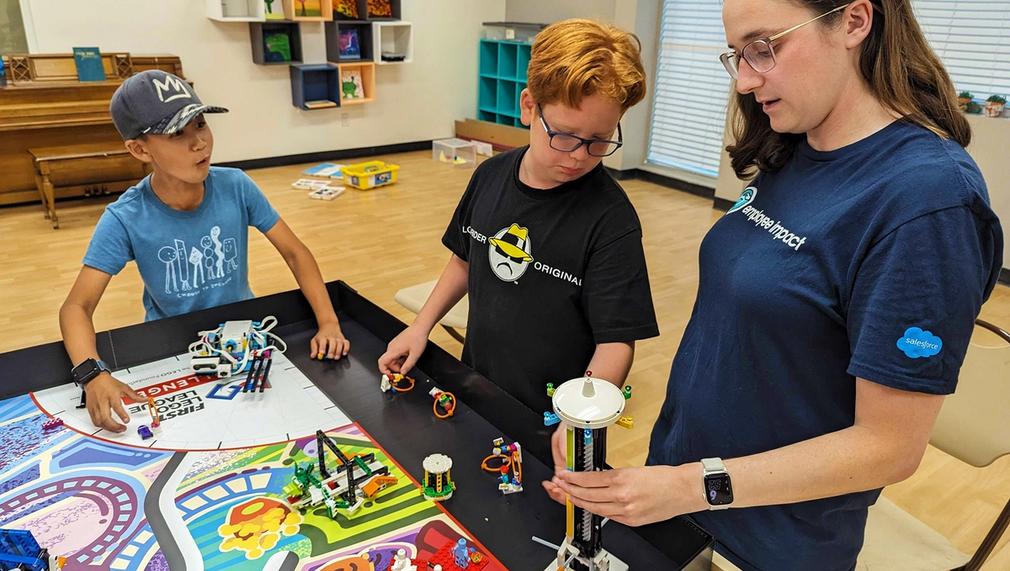Inspiring Creativity and Problem Solving with Robotics
YMCA of the Foothills aims to fulfill the demand for elementary afterschool STEAM programs in the LAUSD northeast district by prodviding STEM and Robotics programming to four LAUSD elementary schools that fall within our service area. 10 week programs, summer camps and FIRST Lego competition teams will offer opportunities for local youth between the ages of 8-14 to explore futures in STEAM fields while also building confidence and addressing social isolation.

What is the primary issue area that your application will impact?
K-12 STEAM education
In what stage of innovation is this project, program, or initiative?
Expand existing project, program, or initiative (expanding and continuing ongoing, successful work)
What is your understanding of the issue that you are seeking to address?
In underserved suburban and rural communities, the demand for afterschool STEM education programs is unmet due to insufficient resources, lack of trained educators, and limited exposure to STEM careers, leading to lower academic performance - especially since 80% of time spent learning is at after school. Disparities in access to technology, engineering, and computer science between boys and girls highlight the need for targeted programs to close gender gaps. Low-income students are less likely to pursue STEM degrees, and program quality varies significantly in our service area. The number of STEM jobs is growing twice as fast as non-STEM careers with 11.2 million STEM job vacancies expected by 2030, addressing this inequality early in the education pipeline, especially among minority girls, is crucial. Nationally, only 15% of girls in 4th-8th grade show interest in STEM. Solving this issue promotes economic mobility, providing a direct path to personal growth and long-term prosperity.
Describe the project, program, or initiative this grant will support to address the issue.
The Y’s hands-on project-based program has centered on girls’ brilliance and potential, with an emphasis on increasing STEM access, belonging, and persistence. Our program introduces youth ages 8-14 to STEM with engaging learning experiences, teaching problem-solving skills and critical thinking through our guided robotics program. The Y is the sole provider of a continuum of STEM curriculum in the Tujunga, Sun Valley, Sunland, and unincorporated foothill communities, where no STEM-certified LAUSD elementary schools exist. By introducing girls to STEM early, we can dramatically alter their educational trajectory. The Y brings together the community, volunteers, mentors, and the next generation's youth to address social isolation and strengthen community ties.Our initiative has two core programs. The first is an intensive 10-week after-school robotics program for 4th-8th grade youth, held at partnering school sites and Y facilities. This program engages participants with technology, promoting technical skills, creativity, and confidence. Instructors and participants meet twice per week, culminating in a LEGO Robotics challenge with other teams across SoCal. The second program offers daily afterschool and summer camp activities for students in 3rd-8th grades. These activities encourage teamwork on experimental projects, fostering learning and exploration. Together, these programs build technical proficiency, inspire innovation, and strengthen the community.
Describe how Los Angeles County will be different if your work is successful.
Our Y first introduced STEM programming in 2016, thanks to board member Kirk Dawson, with the creation of "The Garage," featuring weather tracking systems, robotics labs, builder spaces, and exploration kits. COVID-19 forced the conversion of The Garage to accommodate gym protocols, but the impact on our youth was profound. This inspired us to pilot a robotics program last year. We see an opportunity to expand this program, focusing on increasing the number of women in the STEM workforce by fostering girls' skills and competitiveness. Our goal is to help young girls create, build, and experience technology. In the near term, we aim to be a supportive community, providing mentors to enhance experiences, boost self-confidence, and encourage academic, interpersonal, and emotional development. Long term, we plan to expand into other STEAM areas, recruit and develop certified instructors, and ensure that everyone in our service area has access to and is inspired by STEAM opportunities.
What evidence do you have that this project, program, or initiative is or will be successful, and how will you define and measure success?
The YMCA has previously measured outcomes of STEM programs through registration data and post-program surveys, showing increased interest and pursuit of STEM careers among participants. The current pilot measures impact via pre- and post-surveys, capturing demographic data and program influence. We aim to determine if participants are more likely to engage in technology, science, and engineering activities and if their perception of STEM careers changes due to the program. We will compare their career aspirations before and after the program. Additionally, we will track if participants return to mentor younger students in our high school program and monitor their pursuit of higher education and STEM degrees.
Approximately how many people will be impacted by this project, program, or initiative?
Direct Impact: 300.0
Indirect Impact: 5,000.0